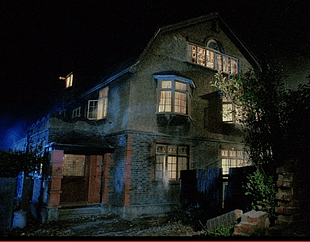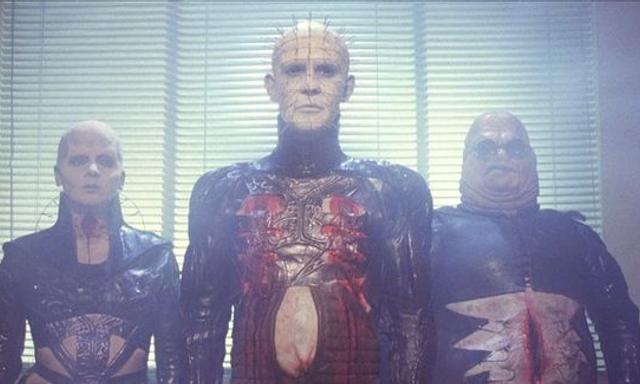Sometime over the last 20 years, it became the law to reboot classic horror films.
'A Nightmare On Elm Street', 'Friday The 13th', 'Halloween' and 'The Texas Chainsaw Massacre have received glitzy Hollywood reboots over the last 20 years, and now it is the turn of 'Hellraiser' to get the reboot treatment.
The new spin on 'Hellraiser' comes to us from 'The Night House' director David Bruckner, and is set for release on Disney+ soon.
The first 'Hellraiser' film was released in Ireland in November 1987, and with the reboot just around the corner, we figured it's high time we revisited the film that made Pinhead a horror icon on the same level as Freddy and Jason.
But hold your horses there, cowboy - the first 'Hellraiser' franchise isn't a horror movie in the same vein.
If you go into 'Hellraiser' expecting a high body count and a non-stop gorefest, you will be let down.
Pinhead is a fairly talkative villain, but he isn't spouting groan-inducing one-liners like Freddy nor is he a silent killing machine like Michael Myers.
In fact, Pinhead is credited as "Lead Cenobite" in the end credits, with the nickname Pinhead not coming until later on.
In hindsight, it is easy to see why Pinhead became the breakout character of the franchise, but it is amusing that he has less than 10 minutes of screen time in the first film.
'Hellraiser' is unquestionably an 80s horror film, but not in the sense you're expecting.
The film is similar to 'The Evil Dead' in a number of ways: both had Stephen King quotes used in the marketing to give it gravitas, the limited budget was used to create some of the nastiest and goriest special effects audiences had seen up until that point, and the films were made by school friends.
Like how Raimi and Campbell teamed up in a rural cabin in Tennesse to create movie magic, Clive Barker knew Doug Bradley from their school days in Liverpool.
Barker offered Bradley a role in 'Hellraiser', as either the clueless delivery man helping lump a mattress up the stairs, or as Pinhead.
Bradley opted for the role of Pinhead as he felt it was important his face was seen in the movie, and the rest, as they say, is history.
'Hellraiser' so effective is that it happens to be a domestic drama with sadistic demons on the edges of the story.
Plot-wise, 'Hellraiser' concerns Larry and Julia Cotton, a couple that is looking to settle down in their marriage and decide to move into the house formerly occupied by Frank's hedonistic and wild brother Frank.
Frank's living family move into his old house, unaware of the literal hell being contained upstairs.
Little does Larry know, Julia had an affair with Frank prior to their wedding, and when Larry's daughter Kirsty enters the picture, it all comes home to roost.
The domestic drama at the heart of 'Hellraiser' sounds like it could have come from the mind of Kenneth Lonergan or John Cassavetes, but halfway through it turns into a gory horror film with demons that punish you for excess.
'Fatal Attraction' was the runaway blockbuster hit of 1987, and it is not hard to imagine the drama in 'Hellraiser' taking place in a different house across town.

'Fatal Attraction' broke box office records and was a major Oscar contender in 1987, while 'Hellraiser' had to settle for a rabid horror fanbase, but the two films are strangely of a piece with each other.
A domestic drama is something that audiences can relate to, and by adding in horror elements in the case of 'Hellraiser' and thriller elements in 'Fatal Attraction' you have the recipe for success.
Glenn Close's character and her bunny boiler tendencies easily could have popped into 'Hellraiser' and Pinhead could have showed up in 'Fatal Attraction'.
The two films have a strong driving theme; the secrets we keep from the people we live with can later come back to haunt us in ways we didn't expect.
The main horror thrills from 'Hellraiser' drive from Frank playing around with a puzzle box that grants him divine pleasure and ecstasy, but he finds himself trapped in limbo with sadistic demons.
Granted, that is a fairly convoluted set-up and we don't find out what Frank's deal is until halfway into the movie, but the film being adapted from the page gives the film a literary quality where character development is the name of the game.
It is this dedication to fleshing out the characters (pun somewhat intended in this context) that makes 'Hellraiser' stand out.
80s horror films often have hilariously bad acting, but 'Hellraiser' has strong lead performances in the form of Andrew Robinson and Clare Higgins that helps separate the film from the pack.
Andrew Robinson is best known for his role as the killer Serpico in 'Dirty Harry' while Clare Higgins is an esteemed veteran of the British stage and screen, and the pair give the film gravitas.
The interplay between Robinson and Higgins is a treat, and while the script is fairly strong, it is elevated by these two great actors.
The rest of the cast can be fairly hit or miss, but with the two key core performances (as well as Doug Bradley's memorable, regal turn as Pinhead) help sell the drama that is the key to the success of 'Hellraiser'.
Don't Box Me In
'Hellraiser' pulls the same trick 'Halloween' did back in 1978 or 'A Nightmare On Elm Street' did back in 1984: it brought the horror into your typical, unsuspecting home.
Based on Clive Barker's novel 'The Hellbound Heart', Barker opted to write and direct the film himself, with the film costing just over £3 million pounds in today's money.
By setting a large portion of the film within the same four walls, it creates a somewhat claustrophobic feeling that really takes hold in the film's explosive final 10 minutes.
The film makes the most of its limited budget, and creates some vivid and gnarly images for the viewer to enjoy.
The ingenuity on display in 'Hellraiser' is what helps distinguish it from its contemporaries, and even with the micro-budget, the visual style of the film is still unforgettable all these years later.
A suspect house in North-West London - a 15-minute drive from Wembley Stadium, we checked - serves as the gateway to hell, and placing the extraordinary in the mundane gives 'Hellraiser' a strange quality.
As we saw in George Miller's most recent film 'Three Thousand Years Of Longing', having the extravagant, fantastical play out in the confines of spaces we know and live in day-to-day lends the film a surreal quality, and for 'Hellraiser', this works perfectly.
The iconography of the series - chains, that puzzle box, Pinhead and the gang - is so rich and striking that it's little wonder a reboot was made.
Christopher Young's haunting and unsettling score is the stealth MVP of 'Hellraiser', and while industrial music fans would love to travel to a universe where Coil conducted the score as originally planned, Young's score is one of the very best scores the horror genre has to offer.
Clive Barker only had direct involvement with the first two movies, with Barker directing and writing the first film and writing the story and producing the sequel, and it is little surprise the franchise drops off a cliff after his involvement with the series ends.
Like the original 'A Nightmare On Elm Street' or 'Halloween', the air was let out of the balloon fairly quickly.
Subsequent 'Hellraiser' sequels lost sight of the personal stories that could be told with the premise - some clueless fool opens a box they shouldn't have and chaos ensues.
1988's 'Hellbound: Hellraiser II' expands on the mythology of the first movie and even tries to make Pinhead redeemable, but the drop-off in quality is stark.
By the time the franchise was direct-to-DVD in the 2000s, 'Hellraiser' movies were like 'Se7en' knock-offs with Pinhead making a guest appearance like the Fonz on 'Happy Days'.
The batting average for the 'Hellraiser' franchise is remarkably low with one flat-out masterpiece, one great film, one enjoyably bad outing, and the rest being some of the most unwatchable dreck horror has to offer.
At the heart of 'Hellraiser' is a great concept - a puzzle box can offer you divine pleasure but also literally send you to hell - and there is value in a reboot.
We may be tempting fate like a character in a horror film, but there is nothing to lose by rebooting the 'Hellraiser' franchise.
















































































